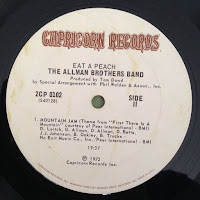"Mountain Jam" was a showcase for the whole band, a lengthy instrumental that was born from The Allman Brothers and The Grateful Dead jamming together on a riff from Donovan's "There is a Mountain". For anywhere between 10 and 45 minutes "Mountain Jam" weaves through melodies from "Third Stone From the Sun" to "Will the Circle Be Unbroken" to "What I Say". The version on Eat A Peach (33 minutes, originally split across 2 LP sides) gives everyone in the band a few minutes in the spot light: the melodic and funky drumming of Butch and Jaimoe and even a sweet and bouncy Berry Oakley bass solo. But it was different every night.
 |
| The Grateful Dead and The Allman Brothers jam at the Fillmore East |
I drew on a few different "Mountain Jam" performances for my version. I needed a framework, so I picked the essential pieces from the band's 2004 In The Studio performance of Eat A Peach as a jumping off point. From there I had to figure out what I could perform and adapt. I wanted to add keys since Gregg Allman's hammond organ is such a presence, but it quickly became too busy. Plus I'm not a good enough keyboard player to justify that much bad piano playing. But I did throw in a few of those keyboard licks on the dobro solo. Same thing happened to the drum section. If I had more time, I might have been able to put together a something more interesting but there is a big gulf between being able to keep a beat and being able to put together a few bars of funky, interesting percussion solo. I initially intended the bass solo to be longer, but as I tried to figure out what to do there I realized I would have just been copying Berry Oakley's licks. So that got cut down considerably. The bass part is actually super simplified. Berry Oakley's bass playing on "Mountain Jam" is relatively busy, moving freely along side Dickey and Duane's guitar themes. I tried playing bass with a little more freedom but it just didn't fit (probably because he was an amazing bass player and I'm not), so I simplified the bass line to something less distracting.



